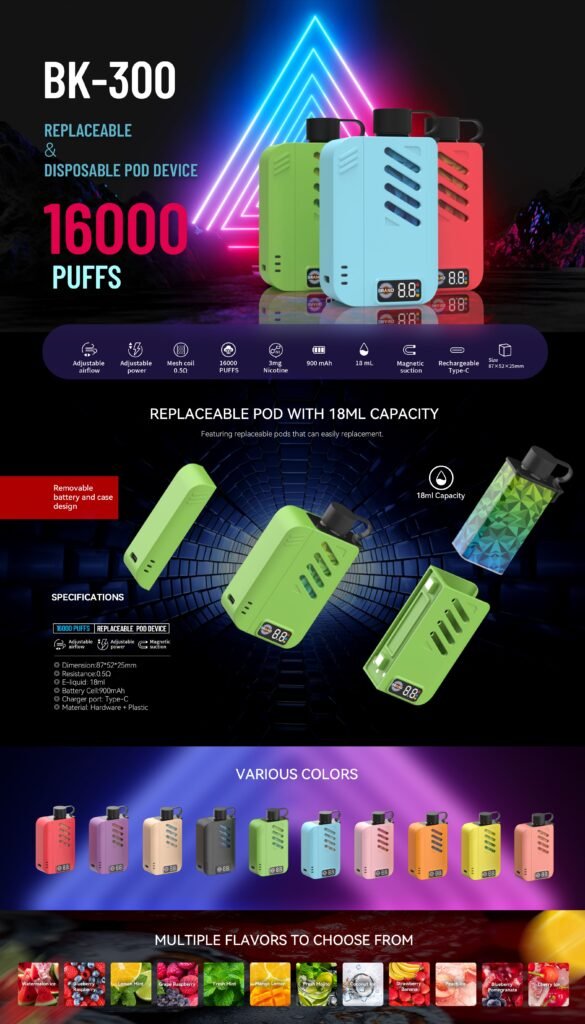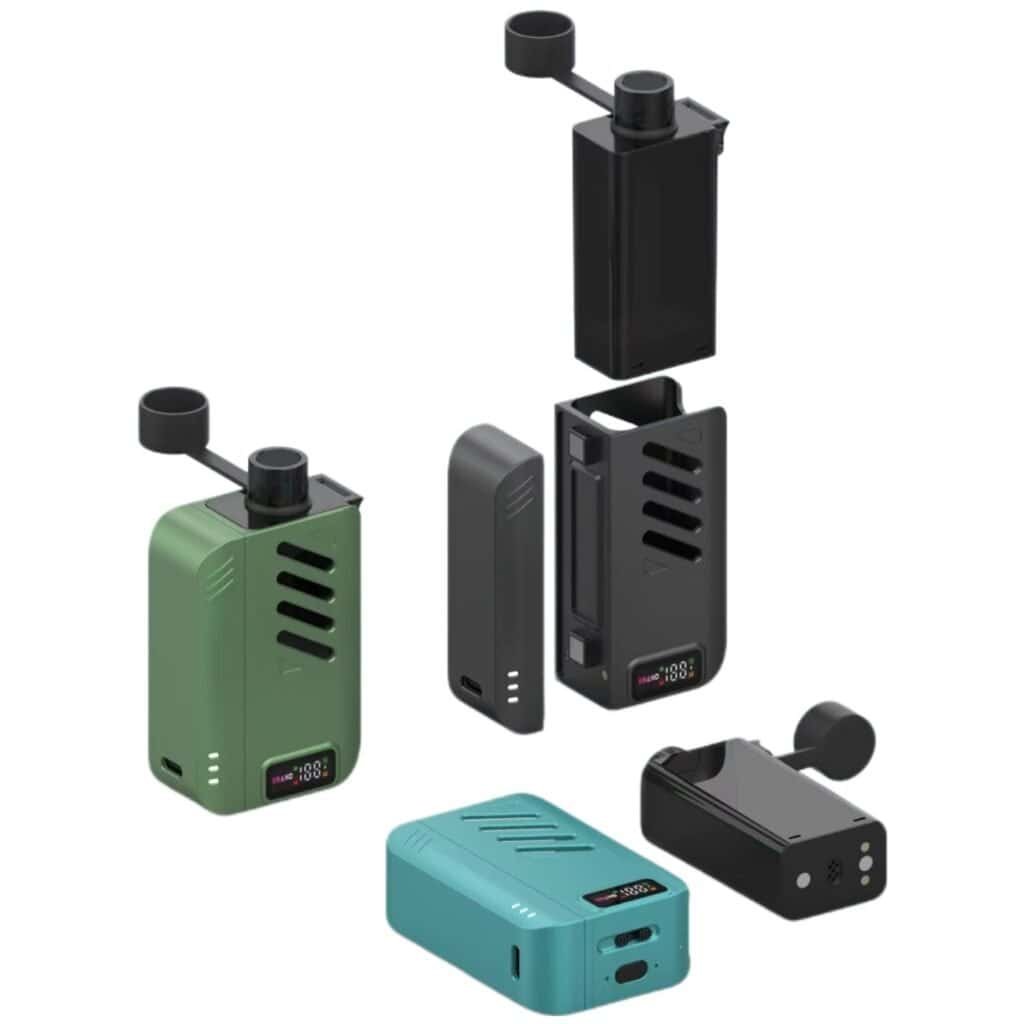Introduction: New Zealand’s Bold Step Towards Public Health
On June 17, 2025, New Zealand officially banned the sale of disposable vapes, marking a significant shift in the country’s approach to vape products. This ban includes a prohibition on advertising, membership-based marketing, and discount sales. The government’s decision is part of a broader effort to curb youth vaping, reduce nicotine addiction, and address environmental concerns related to disposable vape products. As New Zealand takes this bold step, it’s important to explore the reasons behind this change, its potential effects on public health, and the growing demand for more sustainable, long-term alternatives like pod systems.
1. The Growing Concern Over Disposable Vapes
Disposable vapes have surged in popularity, especially among younger people, due to their convenience, affordability, and appealing flavors. However, concerns have risen about the rising rates of vaping among teens, the environmental impact of single-use devices, and the risk of addiction. Research has shown that nicotine addiction in young people can have long-term health effects, including impaired brain development and increased risk of future substance abuse.
In addition to health concerns, disposable vapes have contributed to environmental pollution. Many disposable devices contain batteries and electronic components that are difficult to recycle, leading to increased waste in landfills and potential environmental hazards. These issues prompted New Zealand’s government to take action by banning the sale of these products.
2. Public Health Advocates Support the Ban
Public health experts have largely supported the ban, citing the need to remove a product that contributes to adolescent nicotine addiction. Dr. Jude Ball of the University of Otago stated that removing these products from visible locations is crucial in helping individuals quit smoking by minimizing triggers and temptations. The ASPIRE research group has also suggested additional measures, such as imposing taxes on nicotine products, restricting sales near schools, and providing more support for smoking cessation.
Professor Chris Bullen of the University of Auckland argued that heavily discounted disposable vapes were unethical, especially since such promotions target young people. He believes these sales tactics encourage impulse purchases and stockpiling among teens, exacerbating the problem.
3. The Issue of Industry Marketing Tactics
Before the ban came into effect, many retailers engaged in clear-out sales, using tactics such as “buy one, get one free” offers, countdown promotions, and email marketing to attract customers. Vuse, a major vape brand, heavily promoted their low prices, which sparked concerns about expanding their customer base, particularly among youth.
Advocacy groups like Vape Free Kids have criticized these marketing strategies. Calvin Cochran from Vape Free Kids pointed out that the vaping industry frequently uses aggressive promotional techniques, including SEO (Search Engine Optimization) and social media strategies, to attract younger customers. He argued that advertising restrictions could be more effective in curbing youth exposure to vaping than the product ban itself.
4. Potential Black Market Concerns
The ban has led to fears about the rise of a black market for disposable vapes in New Zealand, much like what has happened in Australia. Jonathan Devery, a prominent industry expert, noted that the black market for vapes in Australia has already reached NZD 2 billion. New Zealand might face similar challenges, with consumers seeking alternative sources to acquire banned products.
Industry associations are urging the government to strengthen enforcement measures to prevent illegal sales while ensuring that legitimate businesses are protected. The black market could create further health risks, as unregulated products may contain unsafe ingredients or be sold to underage individuals without oversight.
5. Environmental Impact and the Need for Change
One of the significant issues with disposable vapes is their environmental impact. Many of these devices are not designed for recycling, and their disposable nature leads to an accumulation of electronic waste. Without an established recycling mechanism, these products are often discarded improperly, polluting landfills and contributing to environmental degradation.
Public health advocates and environmental organizations are calling for a shift to more sustainable vaping solutions. One such alternative is the use of pod systems like the BK-300, which feature replaceable pods and rechargeable batteries. Unlike disposable devices, pod systems are designed to be reused, reducing waste and promoting a more eco-friendly approach to vaping.
6. Pod Systems as a Sustainable Alternative
Pod systems, like the BK-300 device, offer a more sustainable alternative to disposable vapes. These devices come with replaceable pods that can easily be swapped out when needed, significantly reducing environmental waste. The BK-300, in particular, is designed for durability, with features such as:
- Replaceable pods with 18mL capacity: The BK-300 allows users to replace their pods rather than dispose of the entire device, reducing the environmental footprint.
- Rechargeable and efficient: Featuring a 900mAh battery and Type-C charging, the BK-300 offers a long-lasting vaping experience, ensuring users get the most out of each pod without needing frequent replacements.
- Adjustable airflow and power: These features allow for a customized experience, giving users full control over their vaping session.
- Various colors and flavors: The BK-300 is available in multiple colors and offers a wide range of flavors, allowing for a personalized vaping experience.

By choosing a pod system like the BK-300, users can enjoy the convenience and flavor variety that they are used to from disposable vapes while contributing to a more sustainable and environmentally-friendly solution.
7. The Future of Vaping in New Zealand
With the new ban in place, New Zealand is leading the way in tackling the public health and environmental issues surrounding vaping. The government’s actions reflect a growing global awareness of the negative effects of nicotine addiction and the environmental harm caused by disposable products. As other countries may soon follow New Zealand’s example, it is essential for the vaping industry to adapt and focus on sustainable, long-term solutions.
Pod systems, such as the BK-300, represent the future of vaping in a responsible and health-conscious world. By moving away from disposable devices and adopting reusable, eco-friendly options, both the industry and consumers can help reduce the impact of vaping on the environment while still enjoying a high-quality, customizable experience.
Conclusion: A New Era for Vaping in New Zealand
New Zealand’s ban on disposable vapes marks an important milestone in the effort to reduce smoking and vaping-related health risks and protect the environment. While the ban may pose challenges, particularly in terms of enforcement and black-market activity, it is an essential step toward promoting better public health outcomes. As the industry shifts towards more sustainable alternatives like pod systems, the BK-300 represents a leading solution for those looking for a high-quality, environmentally-friendly vaping option. For those in New Zealand, now is the time to embrace change and make the switch to a more responsible and lasting vaping experience.


